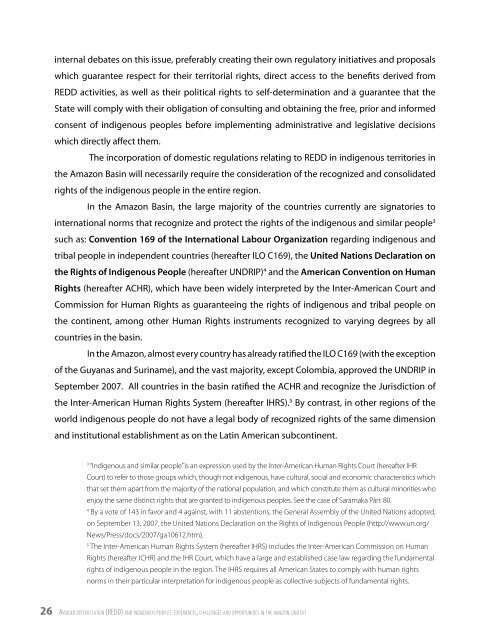Avoided Deforestation (REDD) and Indigenous ... - Amazon Fund
Avoided Deforestation (REDD) and Indigenous ... - Amazon Fund
Avoided Deforestation (REDD) and Indigenous ... - Amazon Fund
Create successful ePaper yourself
Turn your PDF publications into a flip-book with our unique Google optimized e-Paper software.
internal debates on this issue, preferably creating their own regulatory initiatives <strong>and</strong> proposals<br />
which guarantee respect for their territorial rights, direct access to the benefits derived from<br />
<strong>REDD</strong> activities, as well as their political rights to self-determination <strong>and</strong> a guarantee that the<br />
State will comply with their obligation of consulting <strong>and</strong> obtaining the free, prior <strong>and</strong> informed<br />
consent of indigenous peoples before implementing administrative <strong>and</strong> legislative decisions<br />
which directly affect them.<br />
The incorporation of domestic regulations relating to <strong>REDD</strong> in indigenous territories in<br />
the <strong>Amazon</strong> Basin will necessarily require the consideration of the recognized <strong>and</strong> consolidated<br />
rights of the indigenous people in the entire region.<br />
In the <strong>Amazon</strong> Basin, the large majority of the countries currently are signatories to<br />
international norms that recognize <strong>and</strong> protect the rights of the indigenous <strong>and</strong> similar people3 such as: Convention 169 of the International Labour Organization regarding indigenous <strong>and</strong><br />
tribal people in independent countries (hereafter ILO C169), the United Nations Declaration on<br />
the Rights of <strong>Indigenous</strong> People (hereafter UNDRIP) 4 <strong>and</strong> the American Convention on Human<br />
Rights (hereafter ACHR), which have been widely interpreted by the Inter-American Court <strong>and</strong><br />
Commission for Human Rights as guaranteeing the rights of indigenous <strong>and</strong> tribal people on<br />
the continent, among other Human Rights instruments recognized to varying degrees by all<br />
countries in the basin.<br />
In the <strong>Amazon</strong>, almost every country has already ratified the ILO C169 (with the exception<br />
of the Guyanas <strong>and</strong> Suriname), <strong>and</strong> the vast majority, except Colombia, approved the UNDRIP in<br />
September 2007. All countries in the basin ratified the ACHR <strong>and</strong> recognize the Jurisdiction of<br />
the Inter-American Human Rights System (hereafter IHRS). 5 By contrast, in other regions of the<br />
world indigenous people do not have a legal body of recognized rights of the same dimension<br />
<strong>and</strong> institutional establishment as on the Latin American subcontinent.<br />
3 “<strong>Indigenous</strong> <strong>and</strong> similar people” is an expression used by the Inter-American Human Rights Court (hereafter IHR<br />
Court) to refer to those groups which, though not indigenous, have cultural, social <strong>and</strong> economic characteristics which<br />
that set them apart from the majority of the national population, <strong>and</strong> which constitute them as cultural minorities who<br />
enjoy the same distinct rights that are granted to indigenous peoples. See the case of Saramaka Párr. 80.<br />
4 By a vote of 143 in favor <strong>and</strong> 4 against, with 11 abstentions, the General Assembly of the United Nations adopted,<br />
on September 13, 2007, the United Nations Declaration on the Rights of <strong>Indigenous</strong> People (http://www.un.org/<br />
News/Press/docs/2007/ga10612.htm).<br />
5 The Inter-American Human Rights System (hereafter IHRS) includes the Inter-American Commission on Human<br />
Rights (hereafter ICHR) <strong>and</strong> the IHR Court, which have a large <strong>and</strong> established case law regarding the fundamental<br />
rights of indigenous people in the region. The IHRS requires all American States to comply with human rights<br />
norms in their particular interpretation for indigenous people as collective subjects of fundamental rights.<br />
26 Av o i d e d d e f o re s t A t i o n (redd) A n d i n d i g e n o u s p e o p l e s: experiences, chAllenges A n d o p p o r t u n i t i e s in t h e A m A zo n c o n t e x t
















